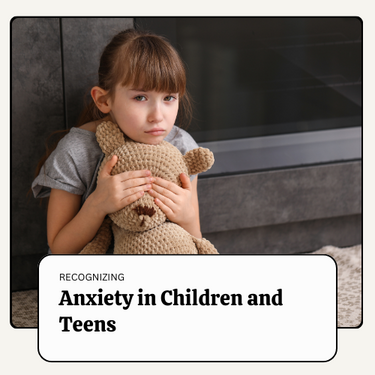
Anxiety is one of the most common mental health conditions in the world. But, we often associate it with adults. In truth, kids can actually be more susceptible to anxiety, especially when it stems from stress.
It’s not fair to think that children don’t struggle with anxious thoughts or even irrational fears. We live in a fast-paced world that seems to be ever changing. Even recently, in light of the COVID-19 pandemic, kids and teens were highly impacted, causing a severe spike in anxiety and depression.
Because of the misconception that kids don’t struggle with anxiety, it’s important to understand and recognize warning signs. You know your child better than anyone, so it should be easy to recognize when something feels “off”.
But, what are the actual signs of anxiety in children? Knowing those red flags can help you teach your child how to cope. With that in mind, let’s cover some of the most common signs.
Behavioral Changes
The first thing you’ll likely notice in your child if they’re dealing with anxiety is a change in certain behaviors.
They might get angry more often, or even show signs of aggression. That could lead to lashing out at family members and friends. Some kids might get in trouble at school, even if they have no prior history of misbehaving.
Many children dealing with anxiety are also easily irritable. If your child had those characteristics before, it might not mean much. But, if their anger and annoyances seem to come out of the blue, it could be a sign that something more serious is going on.
Alternatively, your child’s behavioral changes could appear more fearful. They might not want to go to school. They might feel restless. They might withdraw from things (and people) they love.
Physical Concerns
Anxiety is a mental health condition. But, it’s such a powerful one that it can cause physical symptoms to occur. That’s concerning for anyone, but seeing your child experience any kind of physical pain or discomfort can be hard to handle.
With that in mind, there are some common physical issues to look for if your child is dealing with anxiety, including:
The most important thing is to rule out any medical conditions or underlying illnesses your child may have. Talking to their pediatrician will, at the very least, offer you peace of mind in that regard. But, if they are otherwise physically healthy, it’s time to do what you can to “treat” their mental health.
How Can You Help Them Cope?
That kind of worry can lead to them having trouble concentrating, which can start a vicious cycle of even more worrying.
Everyone wants to be heard and validated—even children. When you recognize some of these signs, the best thing you can do is to talk to them. Ask them how they’re feeling, what they’re struggling with, and anything that might contribute to anxiety.
Teaching your child to be mindful can be a big help, especially when they’re on their own throughout the day. But anxiety is something that rarely goes away on its own.
In many cases, therapy or counseling is the best way to help them cope. A therapist will work with your child to get to the root cause of their anxiety. Once the layers are peeled back and your child recognizes why they feel the way they do, they can truly work on taking control of their thoughts again.
As a parent, it’s never easy to see your child struggling. But, don’t ignore the fact that anxiety can be a real problem for children of all ages. Pay attention to the warning signs, so you can get them the help they need to cope as quickly as possible.
Does your child struggle with anxiety? You don’t have to do this alone!
Getting support from a qualified mental health therapist can help. If you need assistance finding a match, complete our Contact Form.

Sign up for our newsletter to get instant access to parenting resources sent directly in your inbox!
